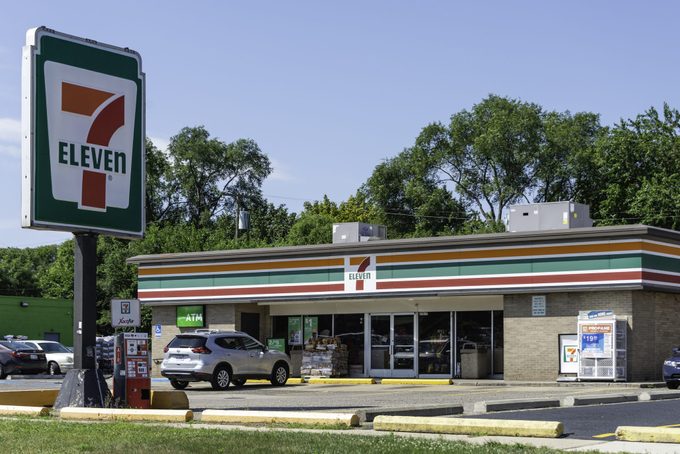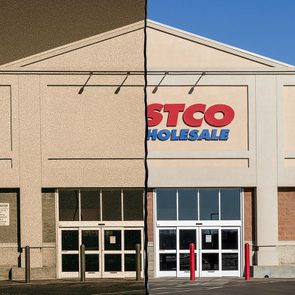Sure, it rhymes, and it's catchy, but it's not quite accurate. Here's how 7-Eleven got its name.

Why Is 7-Eleven Open 24 Hours If It’s Called “7-Eleven”?

Do you ever wonder how businesses get their names? Some are no-brainers, like Barnes & Noble, which pairs the last names of two of the store’s founders. Yet others make very little sense, like Starbucks, which got its now-famous name from Moby Dick, of all places. (Seriously!) And then there’s our favorite convenience store, the one we frequent at all hours of the day and night: 7-Eleven. Have you ever wondered, Why is it named 7-Eleven? It seems like 24-Seven would be a better moniker, no?
Yes … and no. After all, 7-Eleven is so much more than just those two numbers—it’s become synonymous with all-night snacks, year-round Slurpees and road-trip pit stops. And there’s a very good reason for its name and why it’s had such staying power.
Reader’s Digest dove into 7-Eleven’s history and spoke with branding expert Stacey Cohen, co-founder and CEO of Co-Communications, to get to the bottom of it all. Read on to find out what we learned.
Get Reader’s Digest’s Read Up newsletter for more common curiosities, humor, cleaning, travel, tech and fun facts all week long.
How did 7-Eleven get its name?
It all goes back to 1927 and the Southland Ice Company. That’s how the store we now know as 7-Eleven got its start—on the dock of an icehouse in Dallas—and what it was originally called. It mostly sold ice, but then started selling some grocery items like bread, milk and eggs. And yep, that was super helpful to customers, who loved the concept of this new “convenience store.” By the late 1940s and early 1950s, when Southland started to expand beyond its Texas roots and into states like Florida, Maryland, Virginia and Pennsylvania, the company wanted everyone to know its stores were open from 7 a.m. to 11 p.m. That’s when it also created a 7-Eleven logo very similar to the one that’s still in place today.

“The name 7-Eleven dates back to 1946, when the Southland Ice Company rebranded to highlight their new extended hours—7 a.m. to 11 p.m.—which, at the time, was a significant change from typical store hours,” says Cohen, an adjunct marketing professor at Fordham University’s Real Estate/Hospitality Institute. “Most shops closed much earlier, [so this made] quick, everyday essentials far more accessible. It was a smart, no-frills name that stuck, and over time, it became synonymous with convenience itself.”
When did 7-Eleven start staying open 24 hours?
It turns out, college students wanted more from 7-Eleven—specifically, later hours to feed midnight study sessions and cater to their atypical schedules. So, in 1963, an Austin, Texas–based store started staying open 24 hours a day, seven days a week, for the local college crowd. This was a decision made on the part of an entrepreneurial franchisee who saw the potential in these extended hours.
Suffice to say, the concept caught on, and more locations began keeping the round-the-clock hours. Within a few years, 7-Eleven made it a mandate for franchisees stay open 24/7, wherever allowed by law (more on that in a minute). Eventually the answer to the question “Is 7-Eleven open 24/7?” was a resounding yes at all the chain’s stores.
Why didn’t 7-Eleven change its name after that?
As a household name, it just didn’t make sense for the chain to rebrand, and to Cohen’s knowledge, it wasn’t ever really a consideration. “If there had been any talk of it, it never gained traction, which turned out to be a smart move,” she says. “By then, 7-Eleven had built significant brand equity, and changing the name or logo would have meant giving up decades of recognition. From a brand perspective, great brands don’t chase trends. They grow with their audience while staying true to what people already know and trust.”
Also, after a while 7-Eleven customers simply accepted the fact that it was called 7-Eleven, not thinking too much about why it was given that name in the first place.
And if you really think about it, it’s all come full circle—still getting people talking. After all, look at all of us wondering, Why is it named 7-Eleven, anyway?
Are all 7-Elevens open 24 hours?
The majority of 7-Eleven locations—and there are more than 85,000 locations across 19 countries—are open 24 hours, seven days a week. However, due to some local ordinances beyond the control of the retailer, not all stores can stay open all day, every day. The company even explicitly states to franchisees that staying open 24/7 is a requirement to operate a 7-Eleven, with that one caveat.
So where isn’t it allowed by law, and why? While we can’t list all the exceptions to the rule, here’s one example: In 2024, San Francisco legislators approved a two-year program that stops retail, food and tobacco businesses in the city’s Tenderloin district from operating between midnight and 5 a.m. This was done in an attempt to combat crime and boost public safety.
In Albuquerque, New Mexico, you’ll find that most 7-Eleven locations operate from either 6 a.m. to 10 p.m., or 7 a.m. to 9 p.m. There aren’t any specific ordinances stating that stores can’t remain open 24 hours, but there are some noise ordinances in place. Businesses located in residential areas have to be respectful of noise levels after 10 p.m., or they may receive fines for violations. Note that this isn’t the case everywhere in New Mexico; store hours really vary between cities.
However, you’ll always find 7-Eleven open on holidays, even Christmas and New Year’s Day.
Does 7-Eleven have plans to change again?
Yes, but not with its hours or its name. Look for 7-Eleven to evolve more in terms of offering an expanded number of treats, like cookies and pastries, baked in-store. Additionally, you’re likely to see more products fall under 7-Eleven’s own private-label brand, 7-Select. As the prices on just about everything go up, retailers are looking to their private-label brands to keep costs low for consumers, while making themselves a whole lot more money.
About the expert
|
Why trust us
At Reader’s Digest, we’re committed to producing high-quality content by writers with expertise and experience in their field in consultation with relevant, qualified experts. We rely on reputable primary sources, including government and professional organizations and academic institutions as well as our writers’ personal experiences where appropriate. We verify all facts and data, back them with credible sourcing and revisit them over time to ensure they remain accurate and up to date. Read more about our team, our contributors and our editorial policies.
Sources:
- Stacey Cohen, co-founder and CEO of Co-Communications and author of Brand Up: The Ultimate Playbook for College & Career Success in the Digital World; interviewed, July 2025
- 7-Eleven Corporate: “Our Brand Story”
- 7-Eleven Franchising: “Frequently Asked Questions”
- KQED: “SF Supervisors Approve Midnight Curfew for Tenderloin Food, Retail Shops”
- Reddit: “Are all of your 7/11 stores 24/7?”
- 7-Eleven Franchising: “Driving Profits”




















